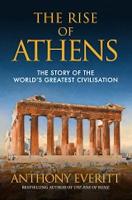
Amberley (2017) p/b 540pp £20 (ISBN 9781445664767)
‘The Rise of Athens’ immediately conveys in a fluent and engaging manner E.’s breadth and depth of knowledge, underscored by a huge enthusiasm for his chosen material. This was born of his childhood, when, as he says in his preface, his reading was of tales of Greek and Roman mythology and later of E.V. Rieu’s versions of Homer’s Iliad and Odyssey, and a translation of Plato’s Symposium: ‘… they introduced me to a world that was new and ravishing, which, for all the tragedy and bloodshed, radiated the sunlight and luminous skies of free thought.’
The preface indicates the book’s subject matter: ‘For two hundred years in the 5th and 4th centuries BC the ancient Athenians pioneered astonishing advances in almost every field of human endeavour … in democracy … the concepts and language of philosophy … in tragedy and comedy, architecture and sculpture … mathematics and natural sciences … in history’.
So E. poses the central question ‘How did a tiny community … manage to give birth to towering geniuses across the range of human endeavour, create the greatest civilisations in history, and lay the foundation of our own political and intellectual heritage?’
He tells us what he will explore: ‘… the Athens I evoke, from its early centuries of kings, tyrants and aristocrats, moving on to the invention of democracy and the city’s political and cultural heyday, and concluding with its decline … readers unfamiliar with ancient history are in for a lively time.’
He begins with the three main players: Athens, Sparta and the Persian Empire.
He begins with a summary of the story of the Greeks in Homer’s epics and emphasises Theseus role as ‘founder’ of Athens. The stories about Sparta provide object lessons for young Spartans. Then, stories about the Great Kings of Persia exemplify what leads to greatness, particularly in making war. Of the striking, even bloodthirsty examples to support his narrative, E. tells of a great battle lost by Cyrus the Great, during which he killed himself for shame, after which his conqueror, the Queen of the Massagetae, found his corpse on the battlefield and stuffed its head into a wineskin filled with blood: ‘I said I would make you have your fill of blood.’
‘The Invention of Democracy’ is a major theme throughout the book: ‘It became clear that the aristocratic moment had passed. Cleisthenes devised a set of extraordinarily complicated constitutional arrangements … the template for the world’s first total democracy, which thrived for most of the next two centuries … and assembled … the citizenry to meet, debate and approve all legislation.’
The next two sections, ‘The Persian Threat’ and ‘The Empire Builders’ concentrate on the extraordinary victories of Athens and Sparta against overwhelming forces of the Persians and their Great Kings. E. takes his time to combine the details of military and naval tactics (including two maps of battle fields, of Marathon and Salamis) in order to convey the tension, excitement and complexity of the preparations and action. He imagines the thoughts and conversations and decisions of the protagonists: the names of Darius and Xerxes, of Leonidas and Themistocles and Miltiades ring through the pages. The ‘marathon’ run by Pheidippides, the Persian bridge of boats across the Bosphorus, and the Spartan resistance until death under Leonidas are just three vivid examples of famous lasting events. After the wars, the charred ruin of the Acropolis was left to remind the Athenians of their suffering and a memorial to the Spartan Leonidas and his Three Hundred at Thermopylae speaks to us:
Go tell the Spartans, passer by,
That here obedient to their laws we lie.
In due course (‘The Empire Builders’) Athens grew to greatness through flourishing trade, rational enquiry, free artistic expression and the impetus provided by democracy. This was despite deadly wars at home and abroad (‘The Great War’ against Sparta, 431-404 BC), and eventual conquest and destruction of democracy by the Macedonians (‘A Long Farewell’). E. seizes the opportunity to let off a final firework in his description (with map) of the Greek defeat at the battle of Chaeronea (338 BC) and his evocation of the character and quality of Macedon’s Alexander the Great. Alexander’s empire fell apart at his death (323 BC), and the rise of Rome ended any prospect of Greek political recovery: Athens would never again be a power in the Mediterranean or a full and free democracy.
E. ends with a reminder of his engagement with the flowering of extraordinary personalities and great thought and art, which he has invited us to share in this memorable panorama. He ends first with a characteristic flourish: a quotation from a twelfth century cleric: ‘You cannot look upon Athens without weeping … A God-forsaken hole!’ But then reminds us of Shelley’s words: ‘We are all Greeks.’
As a non-classicist, the reviewer found E.’s readable account a very satisfactory popular introduction to the subject.
David Matthews
